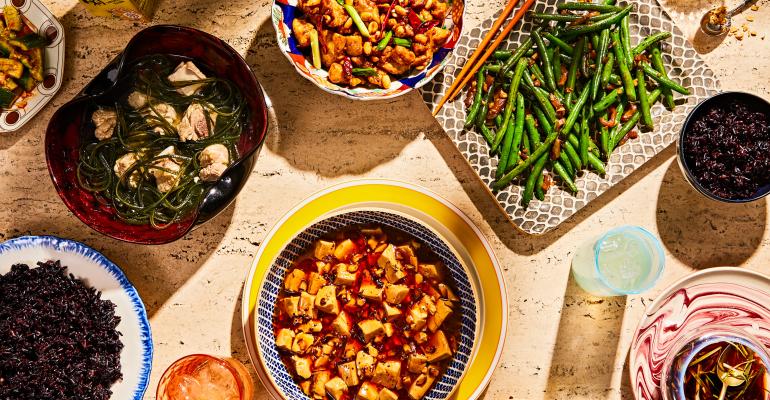Chinah — which loosely translates to Eat Where? In Mandarin — is part of the next generation of Chinese restaurants that is redefining how a Western customer base experiences Chinese cuisine. Chinah opened its first restaurant in Jersey City in 2018 and expanded to New York City’s Financial District in March 2021, with plans to open up two more stores over the next few months.
With its ‘build your own bowl’ format stylized after Chipotle’s massive success with Mexican cuisine, Chinah’s menu is designed to bring Chinese customers back to their childhood lunch boxes and introduce Americans to new flavor profiles, with ingredients like Grandma’s meatballs (inspired by founder/CEO Hegel Hei’s own childhood) with tomato and egg, black rice, five spice egg, and a twist on mapo tofu.
“Anyone with a Chinese background will immediately recognize all of the dishes on the menu because they’re such typical homestyle dishes,” Hei said. “If you walk into any restaurant and ask them to make tomato and egg, they will. It’s like this secret menu that every Chinese restaurant knows. […] We basically wanted to bring that secret menu to light and make it more accessible to everyone.”
Hei said it can be challenging to fight consumers’ preconceived notions of what Chinese food should look like, as they try to make more traditional, balanced, nutrient-rich dishes and adapt to their market without losing their culture.
“A review on our [Jersey City location] Google page actually said, ‘this Chinese food is not greasy so it’s not good,’” Hei said. “It’s an uphill battle we’re fighting.”
But for the team at Chinah, it’s worth the fight. They allow customers to build their own bowls and create their own flavor profiles, but Hei purposefully avoided ingredients that Western audiences would not recognize, instead opting instead for familiar proteins (to American customers) like chicken, beef and fish, and vegetables like string beans, tomatoes and eggplant.
After seeing massive success with their first store in Jersey City, (which he calls an easier foray into the New York City-area market), Hei wanted to open their first store in New York City at the start of 2020. Of course, COVID-19 derailed those plans and they were unable to make headway on a Manhattan store until the end of 2020. But besides dealing with COVId-19-related real estate delays, Hei said that he also experienced his fair share of coronavirus-related racism, including an incident where he was physically attacked by a stranger when he was bringing in boxes to his store with the name and logo of their restaurant.
“Instead of changing our name, hiding behind our walls, we decided to rebrand,” Hei said. “We made our logo even bolder, louder and more in your face. We weren’t going to hide.”
This was not the first time Hei experienced racism. As a child, his boxed lunches were filled with homemade versions of the very menu items he sells today and he would get teasing comments and questions about his food.
“I don't want my kids or the next generation of Chinese-Americans to go through that experience again, because you shouldn’t be embarrassed of your own culture,” Hei said. “You shouldn’t hide your food for the purpose of fitting in.”
Contact Joanna at [email protected]
Find her on Twitter: @JoannaFantozzi





